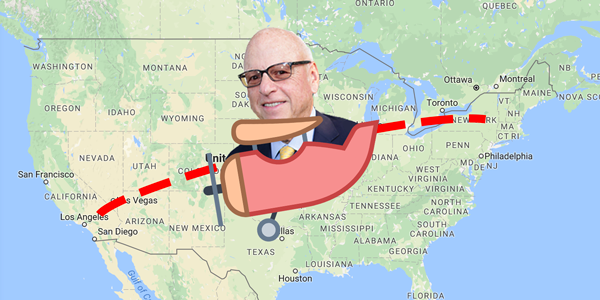Trending
How the West was won: Behind the Elliman-Teles deal, and what it means for LA’s market
“I think [Lorber] came to the conclusion that he wasn’t going to get there without an acquisition.”

From TRD Los Angeles: Approached in 2013 about buying an Aspen-based boutique brokerage Joshua & Co., Howard Lorber balked. The Douglas Elliman boss eventually made the deal, but only after months of wrangling over terms and hammering the price down multiple times.
“I’ve sold Howard one company and it was like going to have my root canal done,” said Steve Murray of RealTrends, who consulted on the Joshua & Co. acquisition. “I think he hates the idea of buying agents.”
In the years since, Lorber has changed his stance, with Elliman making acquisitions in markets such as Brooklyn, Delray Beach and Sagaponack. Those acquisitions were relatively small, however, until late last month, when Elliman made its biggest-ever buy: Beverly Hills-based Teles Properties, which did about $3.4 billion in sales revenue in 2016.
While Elliman declined to reveal financial terms of the acquisition, Murray said that if Teles traded for five times its earnings, the deal, which is slated to close this week, could cost Elliman between $15 million and $20 million.
“It’s an unusually large transaction for Elliman,” said Andrew Heiberger, CEO of New York-based brokerage Town Residential. “From their inception, their growth has been organic. On only a few occasions have they made very small, strategic acquisitions. Maybe the Teles acquisition marks a new era.”
Industry insiders chalked up the deal to Elliman’s struggles with recruiting top-producing agents in L.A. Though the company wooed the Altman brothers from Hilton & Hyland in January 2015, it has failed to recruit other big names since, slowing down its expansion plans. Part of the problem is that top producers at luxury firms like Hilton & Hyland and the Agency also hold significant equity stakes in their respective firms and are therefore very unlikely to move.
“I think [Lorber] came to the conclusion that he wasn’t going to get there without an acquisition,” Murray said of Elliman’s aim to be a major player on the West Coast.
As an acquisition target, Teles was the belle of the ball, sources said, with multiple suitors. The list included Realogy, which owns Coldwell Banker and the Sotheby’s International Realty franchise.
“Everybody’s called us,” said Peter Loewy, chairman of Teles. “We have a lot of really good locations, good agents, strong management. There aren’t many of those out there.”
The acquisition will boost Elliman’s California roster to 630 agents across 21 offices, bringing Elliman’s total headcount to more than 7,000 agents across 110 offices. Stephen Kotler, who heads Elliman’s west coast operation and will serve as CEO of the combined firm, said Teles was a prime target because, like Elliman, its leadership was not actively doing their own deals. Teles’ president Peter Hernandez will be named Elliman’s president of brokerage for California.
“We were originally looking at a growth strategy to do this on our own and it would have been a 10-year plan,” Kotler said. “This speeds us up because a lot of the work has been done already. Peter knows this market like very few people do.”
That local knowledge has been missing from Elliman’s approach to the L.A. market so far, according to Michael Nourmand, head of boutique brokerage Nourmand & Associates.
“Elliman is still known as being more of a New York company than an L.A. company and they are going to have to focus on having deeper L.A. roots and involvement,” he said. “There are different nuances in our marketplace that you have to pay attention to, you can’t just use the rules that apply in New York, here.”
Horacio LeDon, an Elliman alumnus who now heads new development for L.A. brokerage Partners Trust – itself being acquired by Pacific Union International – said the Teles deal gives Elliman a chance to compete with venture-backed firms who can use big signing bonuses and high commission splits as recruiting tools. That’s the playbook Compass has deployed since it first launched in L.A in 2015, sources said.
“L.A. is a tough town,” LeDon said. “The acquisition costs [for agents] are just too expensive and too time consuming to do it organically,” he said. “It takes up too many resources. If you have the financial wherewithal to acquire, that’s the path of least resistance. With Teles, you get a lot of producing soldiers who make a lot of money.”
But choosing to drop the Teles name could render the combined firm less valuable than the sum of its parts, sources said.
“The only good part was leveraging Teles,” one insider said. “Now it just seems like a land grab. It feels to me like New York is just not willing to accept that the L.A people are not being super friendly and warm towards their company.”
Loewy said he believes the Elliman name will give his agents access to greater national and international resources.
“We’re proud of what we’ve done [with the Teles name] but we feel that the Elliman name supplements what we’ve done,” he said. “It not that the Teles name was not a strong one, but it was a local one.”
Teles has few marquee brokers. Only a few agents, such as Chris Pickett, Ernie Carswell and Alison McCormick, have listings priced at around $20 million or more, according to the firm’s website. Sources said they’ll be prime targets for poaching amid the shakeup. On a 2017 TRD ranking of the top 30 L.A. residential brokers, Elliman’s appeared twice — the Altman brothers and Beverly Hills broker Ann Dashiell both made the list.
“I’m sure our competitors are working hard to entice some of the agents to move, but in this case we hope the reason to stay is far greater,” Kotler said.
Those reasons could include golden handcuffs. Sources said that the small pool of Teles agents who do higher-end deals also hold equity stakes in the firm and a contract that promises them a fat payout in the future. Jumping ship would mean foregoing that money.
RealTrends’ Murray said he believes the chances of a mass exodus are slim.
“We’ve closed more than 730 [brokerage sale or merger] transactions and I don’t think I’ve seen more than 4 to 5 percent breakage in the first six to 12 months on more than seven transactions,” he said. “They know what they’ll need to do to minimize that loss.”
The executive team has signed deals to stay for at least five years, Loewy said.
Industry insiders said that while the Teles dramatically increases Elliman’s L.A. footprint, it does little to help the company break into the top tier of the market. Elliman has just seven California exclusive listings priced at $10 million or above, according to its website. While Teles reported total revenues of $3.4 billion last year, most of that came from deals priced between $1 million and $5 million and the average Teles listing is priced between $1.3 million and $1.4 million. And there’s some skepticism about whether Hernandez can lure any major names.
“Teles really does attract agents in L.A. But will this attract an A-list Jade Mills-type talent? No” said one local broker, making reference to the top producer for Coldwell Banker in California. “It doesn’t really solve the issue.”
For now, boutique firms like Hilton & Hyland and the Agency, as well as Coldwell Banker, still have that market largely locked up.
“We’re thrilled every time there is a merger of smaller offices,” said Jeff Hyland, co-founder of Hilton & Hyland co-founder of the merger. “As a boutique, I would rather see fewer boutiques and more supermarkets.”




